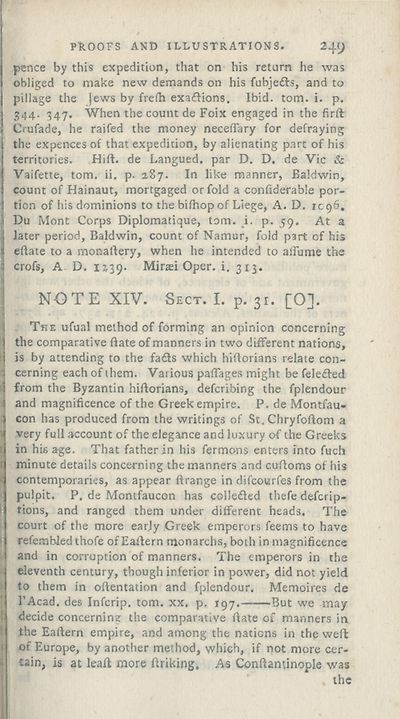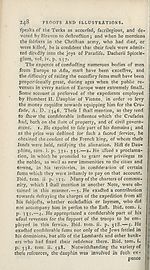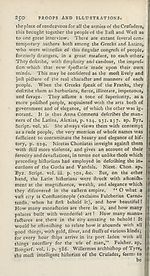Download files
Complete book:
Individual page:
Thumbnail gallery: Grid view | List view

PROOFS AND ILLUSTRATIONS. 249
pence by this expedition, that on his return he was
obliged to make new demands on his fubjefts, and to
pillage the Jews by frelh exactions. Ibid. tom. i. p.
344. 347. When the count de Foix engaged in the firft
Crufade, he raifed the money neceiTary for defraying
the expences of that expedition, by alienating part of his
territories. Hift. de Langued. par D. D. de Vic &
Vaifette, tom. ii. p. 287. In like manner, Baldwin,
count of Hainaut, mortgaged or fold a confiderable por¬
tion of his dominions to the bifhop of Liege, A. D. icg6.
Du Mont Corps Diplomatique, tom. i. p. 59. At a
later period, Baldwin, count of Namur, fold part of his
eftate to a monaftery, when he intended to alfume the
crofs, A D. I?,39. Mirtei Oper. i. 313.
NOTE XIV. Sect. I. p. 31. [O].
Tke ufual method of forming an opinion concerning
the comparative Bate of manners in two different nations,
is by attending to the fa£ts which hiflorians relate con¬
cerning each of them. Various paffages might be feledled
from the Byzantin hiftorians, defending the fplendour
and magnificence of the Greek empire. P. de Montfau-
con has produced from the writings of St. Chryfoflom a
very full account of the elegance and luxury of the Greeks
in his age. That father in his fermons enters into fuch
minute details concerning the manners and cuftoms of his
contemporaries, as appear ftrange in difeourfes from the
pulpit. P. de Montfaucon has collefled thefe deferip-
tions, and ranged them under different heads. The
court of the more early Greek emperors feems to have
refemhled thofe of Ealfern monarchs, both in magnificence
and in corruption of manners. The emperors in the
eleventh century, though inferior in power, did not yield
to them in oftentation and fplendour. Memoires de
1’Acad. des Infcrip. tom. xx. p. 197. But we may
decide concerning the comparative Bate of manners in
the Eafiern empire, and among the nations in the weft
of Europe, by another method, which, if not more cer¬
tain, is at leaft more ftriking. As Conftantinople was
the
pence by this expedition, that on his return he was
obliged to make new demands on his fubjefts, and to
pillage the Jews by frelh exactions. Ibid. tom. i. p.
344. 347. When the count de Foix engaged in the firft
Crufade, he raifed the money neceiTary for defraying
the expences of that expedition, by alienating part of his
territories. Hift. de Langued. par D. D. de Vic &
Vaifette, tom. ii. p. 287. In like manner, Baldwin,
count of Hainaut, mortgaged or fold a confiderable por¬
tion of his dominions to the bifhop of Liege, A. D. icg6.
Du Mont Corps Diplomatique, tom. i. p. 59. At a
later period, Baldwin, count of Namur, fold part of his
eftate to a monaftery, when he intended to alfume the
crofs, A D. I?,39. Mirtei Oper. i. 313.
NOTE XIV. Sect. I. p. 31. [O].
Tke ufual method of forming an opinion concerning
the comparative Bate of manners in two different nations,
is by attending to the fa£ts which hiflorians relate con¬
cerning each of them. Various paffages might be feledled
from the Byzantin hiftorians, defending the fplendour
and magnificence of the Greek empire. P. de Montfau-
con has produced from the writings of St. Chryfoflom a
very full account of the elegance and luxury of the Greeks
in his age. That father in his fermons enters into fuch
minute details concerning the manners and cuftoms of his
contemporaries, as appear ftrange in difeourfes from the
pulpit. P. de Montfaucon has collefled thefe deferip-
tions, and ranged them under different heads. The
court of the more early Greek emperors feems to have
refemhled thofe of Ealfern monarchs, both in magnificence
and in corruption of manners. The emperors in the
eleventh century, though inferior in power, did not yield
to them in oftentation and fplendour. Memoires de
1’Acad. des Infcrip. tom. xx. p. 197. But we may
decide concerning the comparative Bate of manners in
the Eafiern empire, and among the nations in the weft
of Europe, by another method, which, if not more cer¬
tain, is at leaft more ftriking. As Conftantinople was
the
Set display mode to:
![]() Universal Viewer |
Universal Viewer | ![]() Mirador |
Large image | Transcription
Mirador |
Large image | Transcription
| Antiquarian books of Scotland > Kings & rulers > History of the reign of the Emperor Charles V. > Volume 1 > (267) |
|---|
| Permanent URL | https://digital.nls.uk/109185535 |
|---|
| Description | By William Robertson. London : Cadell and Davies, 1798. |
|---|---|
| Shelfmark | ABS.1.76.13 |
| Additional NLS resources: | |
| Description | Thousands of printed books from the Antiquarian Books of Scotland collection which dates from 1641 to the 1980s. The collection consists of 14,800 books which were published in Scotland or have a Scottish connection, e.g. through the author, printer or owner. Subjects covered include sport, education, diseases, adventure, occupations, Jacobites, politics and religion. Among the 29 languages represented are English, Gaelic, Italian, French, Russian and Swedish. |
|---|

